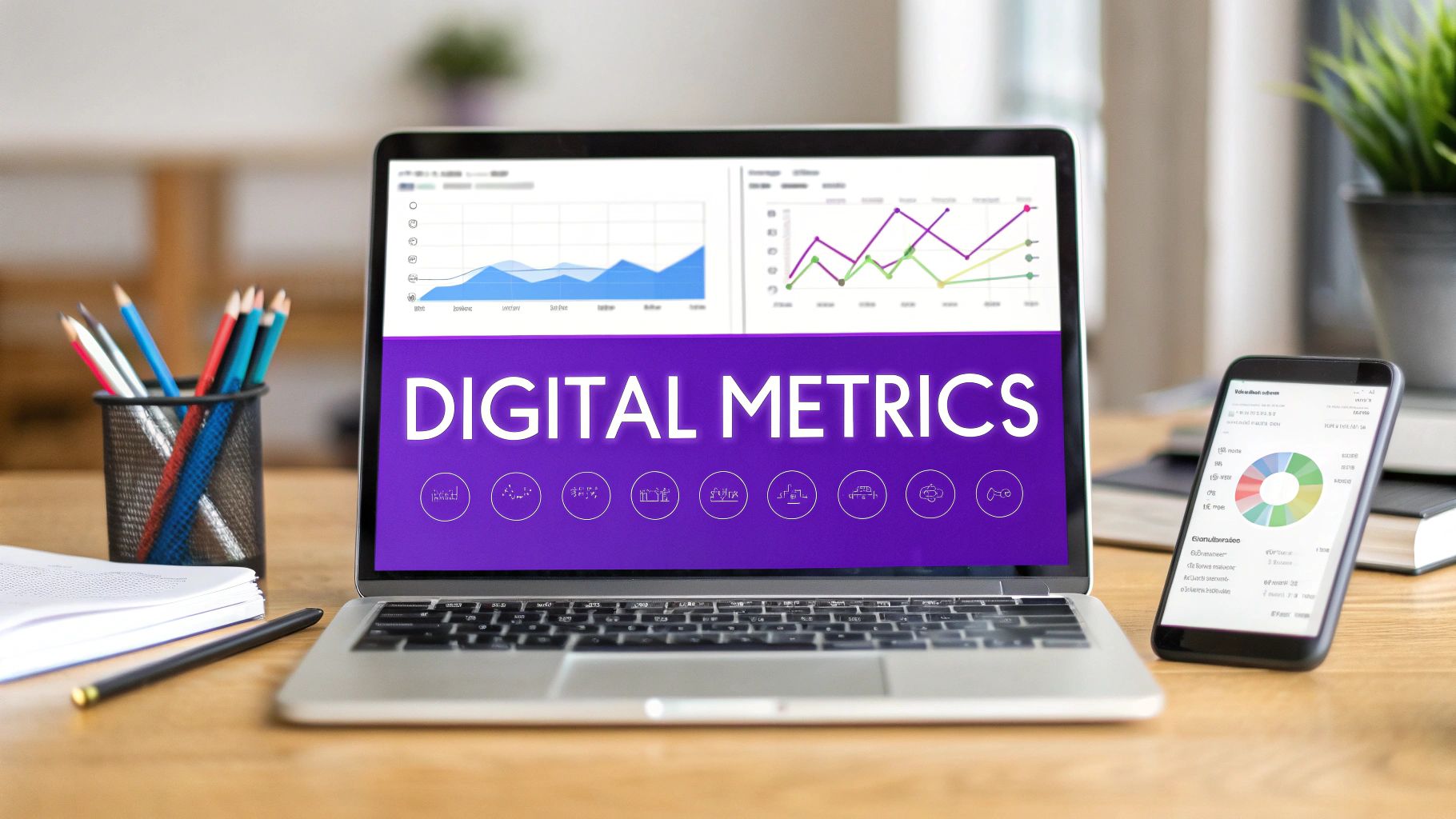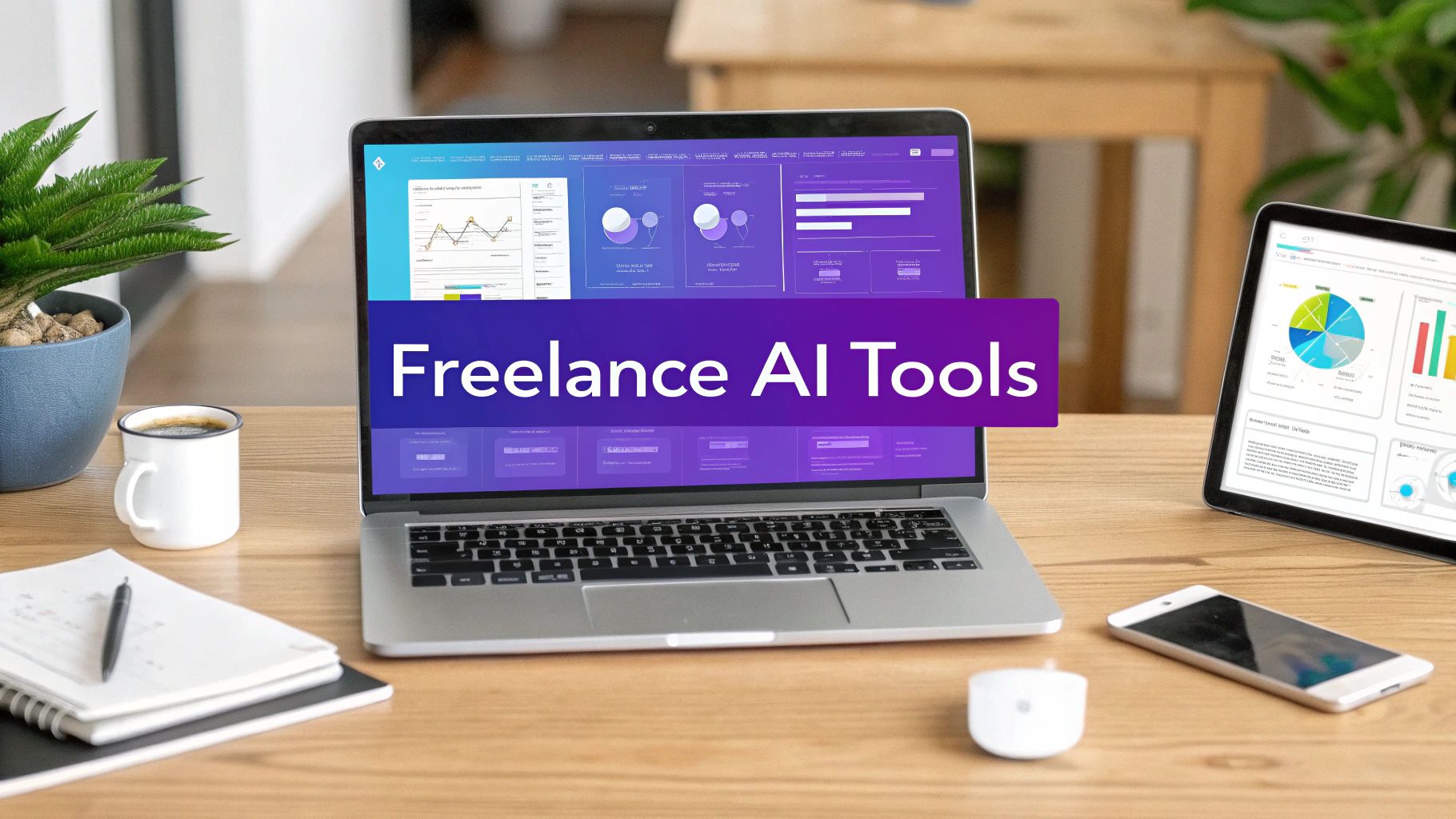White Label Marketing Solutions to Scale Your Agency
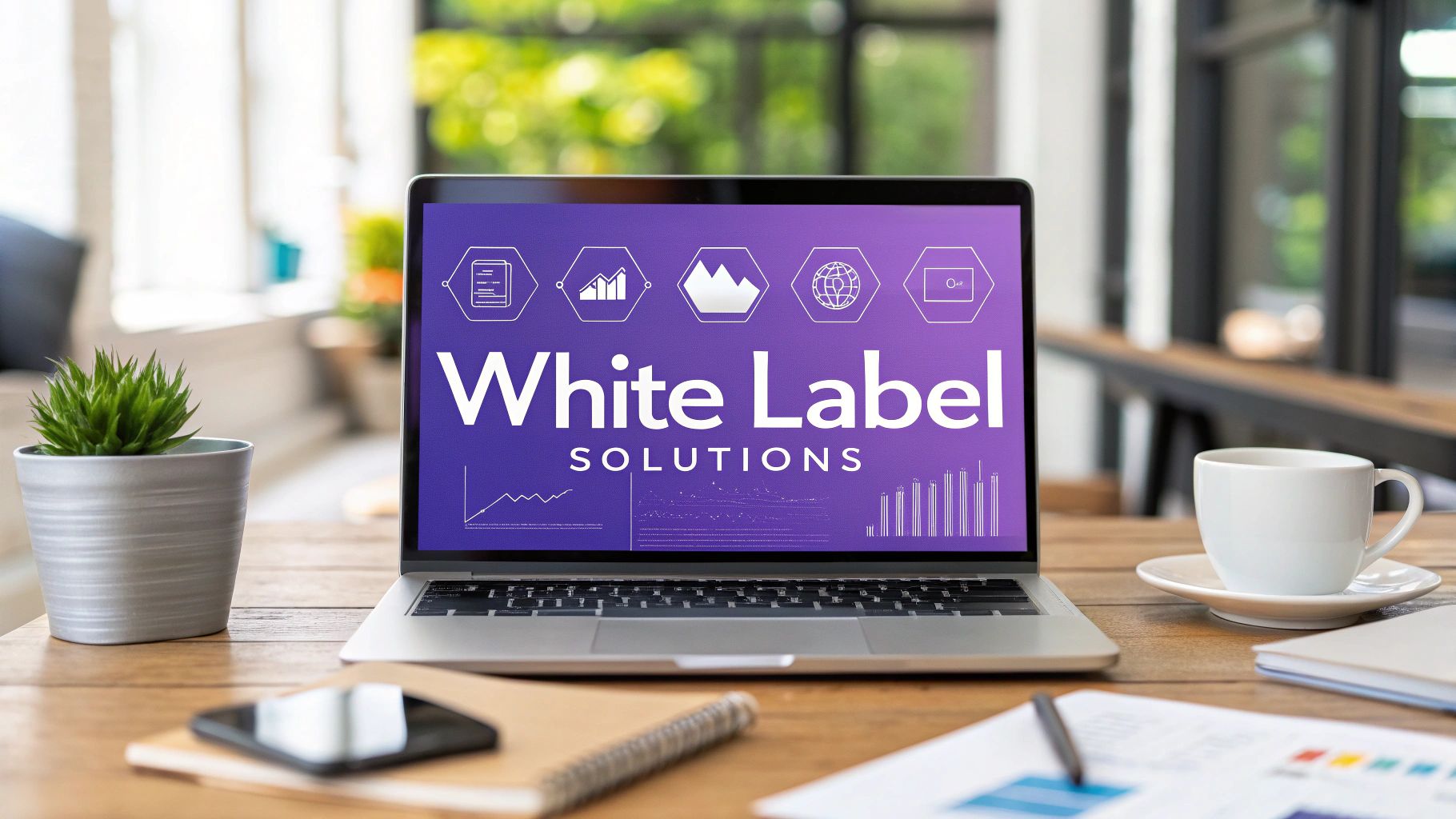
Imagine being able to offer expert SEO, PPC, and content creation services under your own brand—without hiring a single new specialist or training existing staff. That's the core promise of white label marketing solutions: fully-formed, expert services that you can rebrand and sell as your own.
It's a seriously powerful strategy for agencies that want to scale their offerings, and fast.
What Are White Label Marketing Solutions
To really get it, think of your favorite local coffee shop. They're famous for their incredible coffee, but they also sell these amazing pastries that keep you coming back.
Here’s the thing: those pastries probably aren't baked in-house.
Instead, they're brought in from a specialty bakery, popped into the coffee shop's display case, and sold under the coffee shop's name. You, the happy customer, get a delicious pastry and associate that quality with the coffee shop, never knowing (or caring) about the bakery working behind the scenes.

That's exactly how white label marketing works in the agency world. A specialized provider—the “bakery”—creates high-quality marketing services, such as:
- Search Engine Optimization (SEO): Handling all the nitty-gritty keyword research, on-page optimizations, and link-building campaigns.
- Pay-Per-Click (PPC) Advertising: Managing complex ad campaigns on platforms like Google Ads and Meta.
- Content Creation: Writing blog posts, creating social media content, or producing videos. If you want to dive deeper here, our comprehensive content marketing strategy guide is packed with insights.
- Social Media Management: Taking care of post scheduling, community engagement, and performance reporting.
Your agency—the “coffee shop”—simply purchases these services, puts your own branding on them, and presents them directly to your clients. You own the client relationship, you set the price, and you take all the credit for the fantastic results.
To make this crystal clear, here’s a quick breakdown of how these solutions function.
White Label Marketing at a Glance
| Component | What It Is | Primary Benefit |
|---|---|---|
| Service Provider | An expert third-party company that creates the marketing service (e.g., an SEO firm). | Access to specialized skills without the cost of hiring in-house. |
| Reseller (Your Agency) | You purchase the service and rebrand it as your own. | Instantly expand your service offerings under your brand. |
| End Client | Your customer who receives the service, believing it comes directly from you. | Gets a high-quality, seamless service experience from a trusted agency. |
This table shows how the pieces fit together to create a win-win for everyone involved. Your agency grows, and your client gets the expert help they need.
The Core Value for Your Agency
The biggest win here is instant scalability. Instead of spending months and a small fortune hiring and training an in-house SEO or PPC team, you can partner with a white label provider and start selling those services tomorrow. It completely removes the operational headaches that so often slow down agency growth.
The essence of white label marketing is leveraging external expertise to expand your internal capabilities. It lets you focus on your core strengths—client strategy and relationships—while a trusted partner handles the specialized execution.
This kind of strategic partnership lets you become a full-service agency without the massive overhead. You can confidently pitch a wider range of services, win bigger contracts, and keep clients longer by meeting all their marketing needs under one roof. For the client, the experience is totally seamless, which only strengthens your brand and your position in the market.
Ultimately, white label marketing gives you a clear path to growing your agency more profitably and sustainably. It’s about having the power to scale on demand.
The Strategic Edge of White Label Partnerships
Viewing white label marketing solutions as just a way to add a service is missing the point. It's a fundamental business strategy—one that gives you a serious competitive advantage. This isn't just about cutting costs; it's about building an engine for real, sustainable growth. When you partner with a specialized provider, your agency gets an entire team of experts on day one, without the massive overhead and time sink of hiring.
This means you can expand your services, fast.
Imagine your agency is killer at branding and web design, but you keep losing out on bigger contracts because you can’t offer advanced PPC management. Instead of spending the next six months trying to find, hire, and train a specialist, you could partner with a white label provider and start offering expert-level PPC services next week.

That kind of instant capability lets you say "yes" to more opportunities, compete for bigger projects, and ultimately open up new revenue streams with services clients are already asking for.
Fueling Scalability and Profitability
One of the biggest wins from a white label partnership is how it impacts your ability to scale. For most agencies, growth is tied directly to headcount. More clients means more staff, which brings on recruitment costs, training delays, and more management headaches. White label solutions completely shatter that ceiling.
You can suddenly take on five new clients who all need SEO, and you don't have to scramble to find new hires. Your white label partner simply handles the fulfillment, freeing up your core team to focus on what they do best: client strategy and building relationships. This model gives you an elastic capacity to handle whatever work comes your way, so you never have to turn down a great project because you're short-staffed.
This efficiency goes straight to your bottom line. The numbers don't lie: agencies that outsource 40% to 60% of their service delivery have been shown to grow about 2.3 times faster than their peers. Even better, they see profit margins that are 18% to 22% higher. The trend is clear, with over 60% of agencies now outsourcing complex tasks like PPC to white label partners. If you want to see how this translates into actual dollars, it's worth understanding the different ways of measuring return on marketing investment.
Strengthening Your Market Position
When you expand your service list, you stop being just a niche specialist and become a full-service, one-stop solution for your clients. Positioning yourself this way gives you a much stronger foothold in the market.
- Increased Client Retention: When you can solve all of a client’s marketing problems, they have no reason to look elsewhere. A full suite of services creates stickier, more valuable, and longer-lasting relationships.
- Enhanced Brand Authority: Offering a wide range of expert services under your own brand makes your agency look more valuable and authoritative. Clients see you as a true partner who can handle every part of their marketing.
- Greater Competitive Edge: You can go head-to-head with bigger, full-service agencies without needing their headcount or overhead. You get to stay nimble while still offering an enterprise-level service catalog.
Using white label marketing solutions is quickly becoming a signature move for successful modern agencies. It's a strategic shift away from "doing everything" to "managing everything," which lets your agency deliver incredible results across a huge range of marketing disciplines.
By 2025, an estimated 73% of marketing agencies will have incorporated white label services into their business models, signaling a major industry trend toward outsourcing specialized tasks to focus on core competencies and scale more efficiently.
At the end of the day, these partnerships aren't just about outsourcing tasks. They're about building a more resilient, profitable, and scalable business that's built to win in a competitive world.
Finding the Right White Label Marketing Partner
Picking a white label marketing partner is a huge decision. This isn't just another vendor you're hiring; you're choosing an extension of your own team. The right partner works quietly in the background, pumping out high-quality work that makes your agency look like a rockstar.
But a bad choice? That can tank client relationships fast. We’re talking missed deadlines, sloppy work, and a whole lot of explaining to do. This decision demands a serious look beyond just the price tag.
You need to dig into how they communicate, how transparent their reporting is, and whether they actually have the skills they claim. Think of it like hiring a key employee who will never meet your clients but holds their success in their hands. You need a clear game plan to vet them properly and ask the tough questions right out of the gate.
Evaluating Core Competencies and Expertise
First things first: does this potential partner actually know their stuff? Lots of providers will tell you they’re experts in everything under the sun, but the best white label marketing solutions typically come from specialists. If you need top-tier SEO, a partner who just dabbles in it isn’t going to fly.
It’s always a good idea to research the qualities of a top digital marketing partner to get a feel for what excellence looks like. You’re looking for real, tangible proof of their skills, not just empty promises.
Here’s how you can properly vet their expertise:
- Ask for Case Studies: Request specific, anonymous case studies that are relevant to your clients' industries. You want to see hard data showing their impact on metrics that matter, like traffic, conversions, and ROI.
- Review Sample Work: Don't be shy. Ask for examples of the exact deliverables you’d be getting—SEO audits, content calendars, PPC reports, you name it. This is your chance to see their quality standards up close.
- Inquire About Their Team: Who is actually doing the work? Get the details on the experience and qualifications of the specialists who will be handling your accounts.
This infographic can help you visualize which type of partner might be the best fit based on your agency's specific needs.
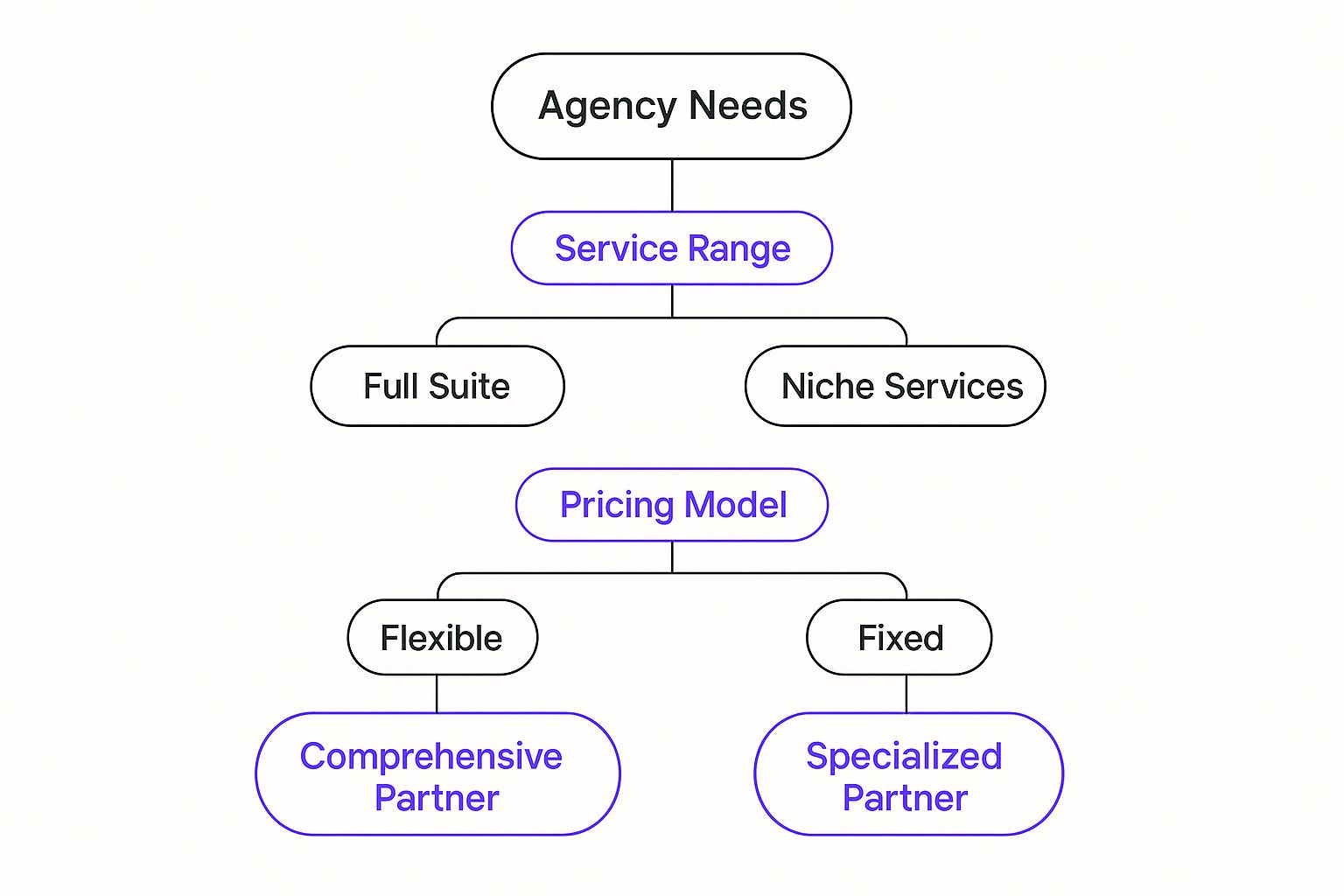
As you can see, an agency that needs a wide range of services with flexible pricing might go for a comprehensive partner. On the other hand, if you just need highly specialized support, a niche provider is probably your best bet.
Assessing Communication and Reporting Workflows
Believe it or not, how a partner communicates is just as critical as the quality of their work. If communication breaks down, even the best partnership can turn into a complete mess. You need a partner who is responsive, proactive, and totally transparent.
The best white label partnerships operate on a foundation of seamless communication. Your partner should feel like an in-house department, not a distant, third-party vendor you have to chase for updates.
You have to set crystal-clear expectations from day one. This is especially true for agencies looking to branch out into new areas like social media. If that's you, our guide on white label social media management breaks down the kind of communication you'll need to succeed.
Here are the key questions to ask about their process:
- What’s your standard communication protocol? Find out if you’ll have a dedicated account manager, what their typical response times are, and what tools they use (like Slack, email, or a project management system).
- How do you handle urgent client feedback or requests? Your clients expect speed, which means your partner needs to be able to move quickly, too. Understand their process for escalating and tackling time-sensitive issues.
- Can we see examples of your client reports? The reports they send you will become your reports. Make sure they’re clean, professional, and clearly show the value you’re delivering to clients. A huge bonus is a partner who offers brandable, customizable dashboards.
Choosing the right white label provider is a big deal, but it doesn't have to be a shot in the dark. Below is a quick checklist you can use to vet potential partners and spot any red flags before you commit.
Key Criteria for Vetting White Label Providers
| Evaluation Criterion | What to Look For | Red Flags to Avoid |
|---|---|---|
| Proven Expertise | Industry-specific case studies, sample work, and specialist team bios. | Vague claims of expertise with no data or examples to back them up. |
| Communication | Dedicated account manager, clear response times, and proactive updates. | Unresponsive contacts, disorganized communication, or no clear point person. |
| Reporting Quality | Brandable, easy-to-understand reports that clearly show ROI. | Generic, data-dump reports that don't explain the "why" behind the numbers. |
| Scalability | Ability to handle more work as your agency grows without a drop in quality. | A small team that seems stretched thin or has no clear process for growth. |
| Cultural Fit | A collaborative, transparent approach that feels like a true partnership. | A "vendor" mindset that feels transactional and lacks a sense of shared goals. |
Using a structured framework like this helps ensure you're not just picking a provider, but a long-term partner invested in your success.
Ultimately, this decision is a strategic investment in your agency’s future. By focusing on proven skills and flawless communication, you can build a reliable partnership that fuels your growth and keeps your clients happy.
Integrating White Label Services Into Your Agency
So you’ve picked your white label partner. Pop the champagne, because that’s a huge step. But the real work? It’s just getting started. Weaving a new white label service into your agency isn't just a technical task—it's a full-blown operational shift that demands a solid plan.
Wing it, and you'll end up with internal chaos and a clunky client experience, which completely defeats the purpose.
The goal is to make the new service feel like a natural, in-house extension of what you already do. When you get it right, the transition is so smooth that your agency just seems to have leveled up its capabilities overnight.
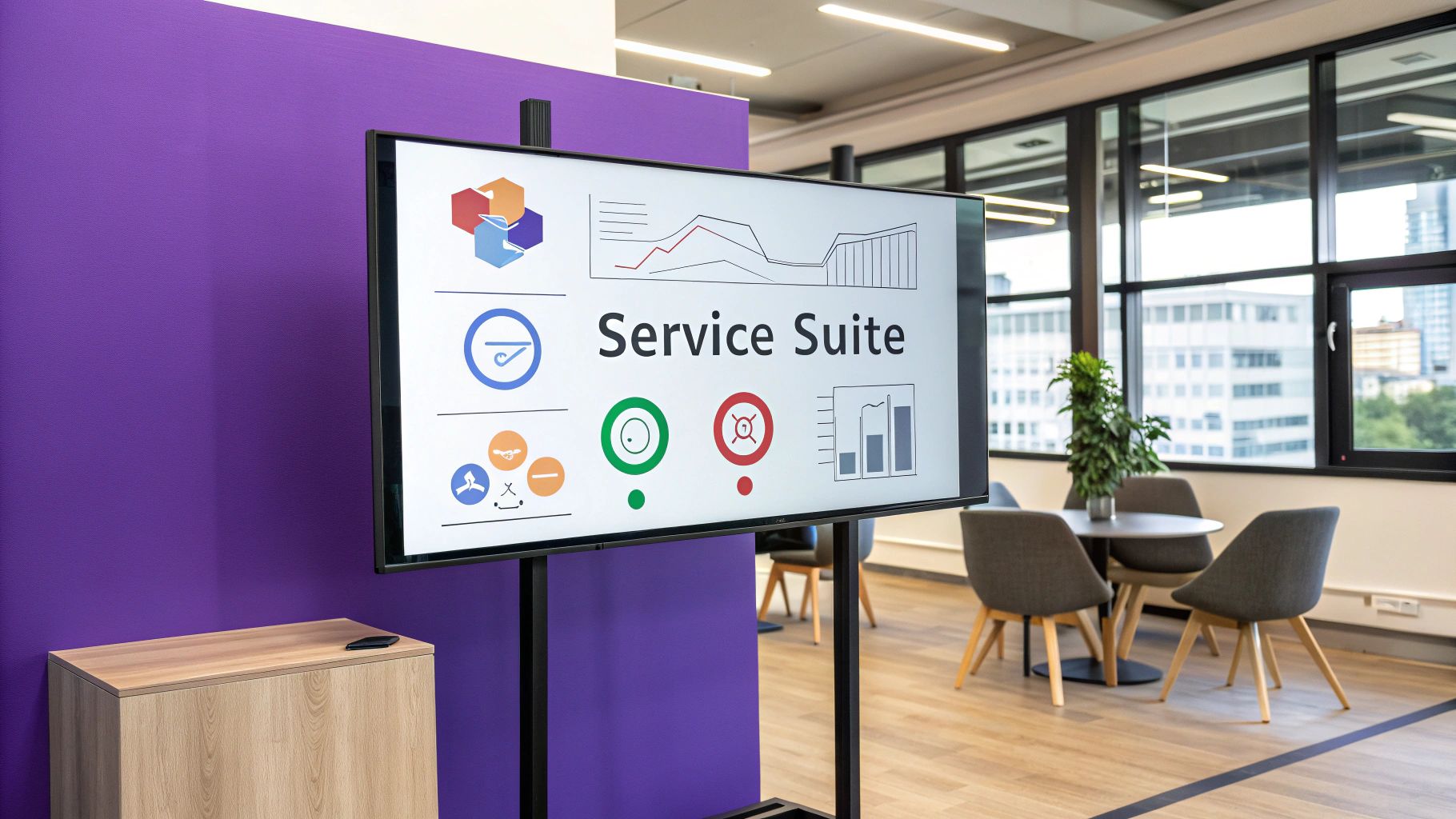
Building a Foundation for Success
First things first, you need to build the infrastructure for a seamless partnership. This is all about setting up crystal-clear communication channels and nailing down your workflows before a single client project kicks off. Think of it as laying the internal plumbing that connects your agency to your new partner.
A simple but critical first step is to assign a single point of contact on both sides. This person is the designated go-to for relaying information, handling problems, and making sure nothing gets lost in translation. No more "too many cooks in the kitchen" issues.
To get everyone on the same page, focus on these foundational steps:
- Set a Communication Rhythm: Decide on a regular schedule for check-ins, like weekly syncs, to talk through active projects, upcoming work, and any potential bumps in the road.
- Agree on Your Tech Stack: Get aligned on the tools you'll use. Whether it's Slack, Asana, or a shared project board, pick a platform to keep all your comms and files in one transparent place.
- Map Out the Onboarding Process: Create a repeatable workflow for getting new clients set up with the white label service. For a great starting point, check out this guide on creating a stellar client onboarding process template.
Aligning on Reporting and Branding
For your clients, the reports you deliver are the proof in the pudding. It is absolutely non-negotiable that any report from your white label partner looks and feels like it came directly from your team. This is about protecting your brand and staying in control of the client relationship.
Work hand-in-hand with your partner to customize their reporting dashboards. This means adding your logo, tweaking the color palette to match your brand, and making sure the KPIs you're showing are the ones your clients actually care about. A report should tell a compelling story of progress, not just be a data dump.
The true test of a great integration? When your own team can't tell where your work ends and the partner's begins. That's the level of cohesion you're aiming for.
Pricing and Positioning Your New Services
With the operational side buttoned up, it's time to talk money. You need to price your new white label services for profit and get your team fired up to sell them. A common rookie mistake is to just tack a small percentage onto the partner's cost. Don't do that. Instead, price the service based on the value it delivers to your client.
The white label marketing automation market is a perfect example. It's on track to hit $4.2 billion by 2025, growing at a massive 38% annually. With implementation taking anywhere from 4 to 14 weeks and 81% of deployments needing custom workflows, the value is clearly in the expert execution, not just the software. Agencies and providers often split the revenue, with shares ranging from 20% to 50%, giving both sides skin in the game.
Finally, get your marketing house in order. Update your website and sales materials to show off your expanded capabilities. Position these new offerings as core services—fully baked into your agency's value proposition—and give your sales team the training they need to sell with confidence.
Scaling Your Agency with White Label Marketing
Bringing white label marketing into your agency isn't just about adding another service to your menu—it's a complete strategic overhaul of how you grow. Think of it like swapping out a manual assembly line for a fully automated one. Suddenly, your growth isn't capped by your team's bandwidth. Instead, you can scale up or down as needed, building a far more resilient and profitable business.
This model fundamentally shifts your agency from being the one "doing everything" to the one "managing everything." By handing off the specialized, time-sucking execution of things like SEO or PPC to a trusted partner, you free up your core team. They can finally ditch the weeds and focus on the high-value work that actually moves the needle, like client strategy, building relationships, and landing new business.
From Tactical Tool to Strategic Lever
This approach creates a stronger, more adaptable agency. Instead of getting bogged down by the usual growing pains—like frantic hiring sprees and resource bottlenecks—you gain an elastic ability to take on new clients. It’s the kind of flexibility that lets you say "yes" to bigger, more complex projects that were once out of reach, completely changing your revenue potential.
And you wouldn't be alone. The global white label product market, which includes white label marketing solutions, is on track to hit around $50 billion a year by 2025. This explosion is driven by agencies just like yours, all looking for expert teams and broader service offerings to keep up with demanding clients.
White label partnerships are the ultimate force multiplier for an agency. You get the expertise of an entire specialized team for the cost of a single service, instantly amplifying your capabilities and market position.
This kind of partnership lets you build out a comprehensive service catalog, all under your own brand. You become the one-stop shop for your clients, which not only keeps them around longer but also cements your authority in a very crowded market.
Unlocking Your Agency’s Full Potential
At the end of the day, integrating white label services is about future-proofing your business. It allows you to offer a full suite of services with predictable costs and consistent quality, which is exactly what you need for long-term stability and profit. For a deeper dive into structuring your finances around this model, our guide on how to price consulting services lays out some invaluable frameworks.
To really kick growth into high gear, agencies can even explore niche options, like launching a white label affiliate program for their SaaS clients, which opens up entirely new revenue streams.
When you start seeing white label partnerships as part of your agency’s DNA, you stop trading time for money. You start building a scalable system for success. It’s the key to unlocking sustainable growth, delivering better results, and building the agile, competitive agency you've always wanted to be.
Common Questions About White Label Marketing
Stepping into a white label partnership can feel like a big move, and it's totally normal to have questions about how it all works on a practical level. Agency owners often wonder about the day-to-day operations and what's really going on behind the scenes. Let's clear up some of the most common uncertainties.
One of the first things people ask is about billing. It's actually pretty straightforward: your white label partner invoices your agency directly for the services, usually on a monthly or per-project basis. You then turn around and invoice your client at the retail price you’ve set, rolling the cost right into your other services. This setup keeps you in the driver's seat, with full control over your pricing and the client relationship.
That brings up another big concern: will my clients know I’m using someone else? If you pick the right partner, the answer is a firm no. The whole point of white label marketing solutions is complete anonymity. Every single deliverable, from reports to dashboards, comes branded with your agency’s logo and messaging. For your client, the experience is completely seamless.
Ensuring Quality and Profitability
Let's be real, your agency's reputation is everything. That’s why the question of quality control always comes up. The best way to make sure a partner’s work is up to your standards is to put them through a serious vetting process before you sign anything.
- Request Sample Work: Don't just take their word for it. Ask for anonymized reports and deliverables so you can see their quality firsthand.
- Establish a Review Process: Create an internal workflow where your team gives everything a final look before it ever reaches the client.
- Set Clear Expectations: Spell out your quality standards and KPIs in your partnership agreement from day one. No surprises.
Taking this proactive approach ensures the work they deliver always lives up to the promise your brand makes.
Finally, let's talk about the money. What kind of profit margins can you actually expect when reselling these services? While it can vary, most agencies see margins somewhere between 30% and 60%, and sometimes even higher.
Your profit margin is a direct result of the value you add. By managing the client strategy and relationship while the partner handles execution, you can price services based on the outcome delivered, not just the wholesale cost.
By marking up the wholesale cost and bundling services, you create incredibly profitable offerings that can scale without bloating your overhead. This model is literally designed to boost your bottom line.
Ready to elevate your professional brand and expand your agency's offerings? MakerBox provides AI-driven tools, including white-label options, to help you and your clients build a powerful online presence. Explore MakerBox and start transforming profiles today.




